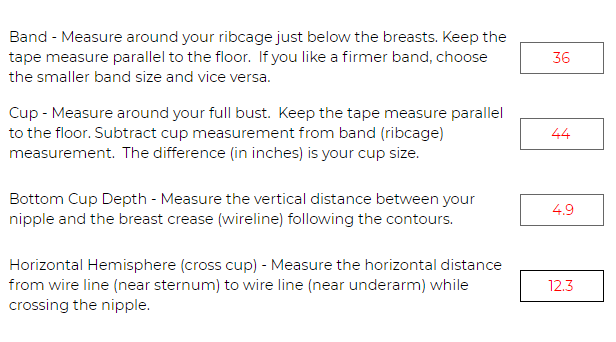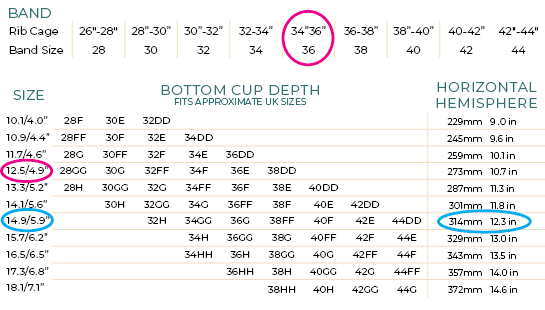Sizing Suggestions for our Underwire Bra Patterns
Our underwired bra patterns uses a combination of measurements such as bottom cup depth (BCD) AND horizontal hemisphere (HH) to determine size. More measurements = fewer muslins! Today's post will feature how to select a size (or three!) for those who do not fall squarely within a specific size.
Here’s a sample of someone’s measurements. Lets call her Heidi.
In our sample, traditional methods indicate size 36FF (14.1cm/5.6”) with a horizontal hemisphere of size 14.9cm/5.9” and a bottom cup depth of size 12.5cm/4.9”!
The final determining factor would be the underwire used.***
In underwired bras, the design and fit starts and begins with the wire. Therefore, regardless of cup and band size(s) you may ultimately need, your cradle MUST match your wire.
This is our OLD sizing chart - all information is the same, just not as well organized. If you would like to view the NEW version, click HERE.
In our sample, lets just say Heidi’s best fitting underwire is 13.3cm/5.2”. Combined with the HH of 14.9cm/5.9” and a BCD of 12.5cm/4.9”, this would indicate 3 different sizes! Here’s what to do:
CRADLE
Stick with the 13.3cm/5.2” cradle since that best fits your wire. Be sure the base curve matches. The wire opening can be a little narrower (say 15mm) as LilypaDesign Patterns are designed with wire spring. Wires can be taller (you can always trim down with some heavy duty wire cutters as necessary). Select your back band piece based on your cradle size and you’re ready to roll.
CUPS
Since your HH is larger than the BCD, start with the larger cup size and REDUCE the BCD to fit. Since the actual cradle needed is smaller than the HH size, you may need to add small darts or gather the wireline of the cups to fit. A detailed tutorial on this available [HERE].
If your HH matches your BCD, but does NOT match the cradle, make the cups fit the cradle. This may require you to gather the wireline or add some tiny darts in the seamlines. Dart Tutorial Link [HERE]
If your HH matches your cradle, but does NOT match the BCD, increase/decrease the BCD to fit your body.
As always, we recommend making a muslin to test out any new bra pattern before jumping into your nice fabrics. Just make sure your tester fabrics have the same stretch percentage as the final fabrics to ensure proper fit. I’ve extolled about the benefits of making a fitting band [link HERE] before but it bears repeating. Take the time to make a fitting band - it will help you determine your best fitting underwire (or confirm it) without the cups in the way as well as tease out any center bridge issues (too wide at top, too narrow at bottom, etc). Once complete, you can also use it to quickly baste on tester cups. Combine this with some wash-away thread and its possible to test out 4-5 cup changes in one afternoon!
***If you already have a favorite underwire, simply compare it to our wire chart to determine cradle size. If you DO NOT have a well fitting underwire, take a breast root trace [great tutorial HERE] and compare to the underwire chart of your favorite bra supply vendor AND our wire chart.


